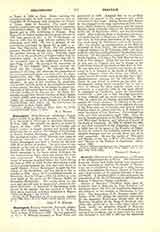

Beauregard, PIERRE GUSTAVE TOUTANT, soldier, b. near New Orleans, Louisiana, U.S.A., May 28, 1818; d. there February 20, 1893. He was appointed to the U.S. Military Academy at West Point andgraduated in 1838. Assigned first to an artillery regiment, he passed to the engineers and served thereafter in that corps. During the war with Mexico he was engaged in the siege operations at Vera Cruz, Cerro Gordo, Contreras, Chapultepec, and the city of Mexico, being wounded twice in the last-mentioned battle (13, September 14, 1847), and was brevetted major. After fourteen years of continuous service he was made Captain of Engineers, March 3, 1853. The war over, he was given supervision of the construction work along the Gulf roast, and on January 23, 1861, was detailed as superintendent of the Military Academy at West Point. He almost immediately resigned, however, on February 20, 1861, and threw in his lot with the seceding States of the Southern Confederacy. He was placed in command at Charleston, South Carolina, and began the Civil War by the attack on Fort Sumter. When the fort was evacuated he was sent to Virginia and was in charge of the Confederate forces in the battle of Bull Run, July 21. He was then sent to Tennessee, was second in command to A. S. Johnson at the battle of Shiloh; succeeding Johnson, when the latter was killed, he nearly routed the Union army in the first day’s fight. Reinforcements arriving for his adversary, Gen. Grant, he was forced to retreat on the next day. Beauregard’s failing health compelled him to take a leave of absence for three months, when, with a promotion to a general’s rank, he was again placed in command at Charleston, where he successfully resisted for a year and a half the siege operations of Gen. Gilmore and his naval assistants. In May, 1864, he joined Lee in Virginia and held Petersburg against the Union advance. In October of the same year he was made commander of the military division of the West and sent to Georgia, and then to North Carolina where he united with Gen. J. E. Johnson to resist the march of Gen. Sherman. The attempt was futile and they surrendered, April, 1865. After the war he became president of the New Orleans, Jackson and Mississippi Railroad, and Adjutant-General of the State of Louisiana. In 1866 he refused the offer of the chief command of the Rumanian army, and in 1869 that of the army of the Khedive of Egypt. He lent his name to the Louisiana Lottery and as its salaried manager was for several years one of its chief supporters. He was the author of “Principles and Maxims of the Art of War” (Charleston, 1863) and “Report of the Defense of Charleston” (Richmond, 1864).
THOMAS F. MEEHAN

